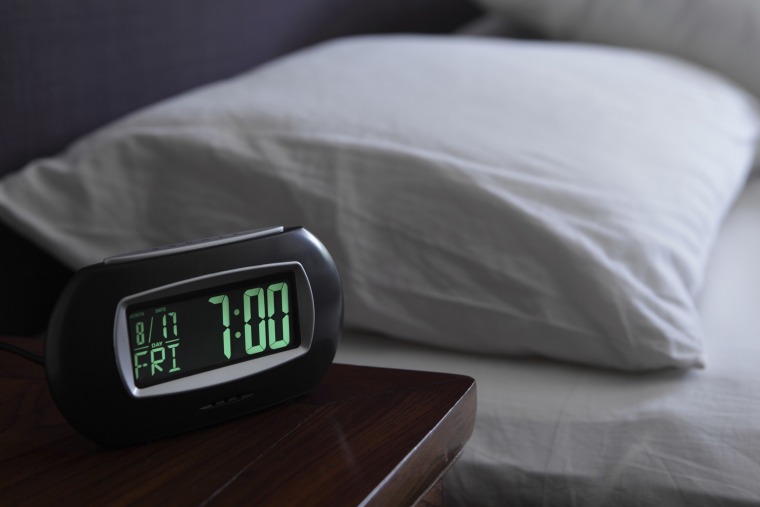Trucker-turned-fitness-instructor Siphiwe Baleka is sleeping better and getting his body in shape for the long haul. The founder of Fitness Trucking discovered his niche training truck drivers to get in shape and improve their health.
Devastated after failing to qualify for the U.S. Olympic Swimming Trials when he was a competitive swimmer at Yale University, Baleka dropped out of school and spent the next 15 years traveling the world. In 2008, the athlete became a long-haul truck driver. The job allowed him to make a steady income while satisfying his urge to travel. But the sedentary occupation caused the former swimmer to put on 15 pounds in just two months.

“For most of my life I was very fit and [had] great abs,” Baleka told NBC News BETTER. “[I] would look in the mirror [and] was very proud of my body. Now all of a sudden I’ve got love handles.’”
To get back in shape, the trucker worked out at rest stops, gas stations and parks on his downtime.
“I started to think, ‘Hey, there is a fitness and nutrition program for everyone in America except long-haul truck drivers,” he said.
Getting back in shape inspired Baleka to found Fitness Trucking, an award-winning fitness program for truck drivers. Baleka knew from experience that truckers are faced with a unique set of challenges. According to him, not only are they sedentary for long periods of time, but they lack one of the most vital components of a healthy metabolism: sleep.
RELATED: 10 Amazon Prime Workouts You Can Do Anywhere
The National Sleep Foundation recommends between 7 and 9 hours of sleep for adults. Truckers are among the country’s most sleep deprived, getting less than five hours a night on average, according to Baleka.
“You have all these severe limitations and restrictions and with your schedule always changing it throws off your circadian rhythms, [which] has an effect on your hormone production and in particular the hormones that regulate your metabolism,” explained the fitness instructor.
The hormones that regulate hunger are produced while we sleep, according to Baleka. When you don’t get enough sleep, you don’t get enough of the hormones that maintain a healthy, efficient metabolism, he explained.
RELATED: The Nighttime Routine That'll Make You More Productive Tomorrow
“Ultimately the result is the circadian rhythms are disrupted, the hormone production is thrown out of whack, and drivers literally lose the ability to regulate their metabolism or their hunger,” he said.
The sleep-deprived put on pounds as these hormonal imbalances throw the metabolic system out of whack, causing them to overeat or skip meals entirely, Baleka said.
Six Steps to Rev Up Your Metabolism While You Sleep
According to the former trucker, you can speed up your metabolism by taking the right steps to improve your night-time habits.
1. Track your sleep
Baleka recommends purchasing a wearable sleep tracker that can help you track your sleep and measure fatigue levels throughout the day.
“Just by being aware of them, you can start to correct and normalize them,” he explained.
2. Create a sleep routine
Going to bed at the same time every night and waking up at the same time every morning establishes a routine for a normal sleep pattern, Baleka said.
“You want to set a routine where you condition your body ahead of that time to know that that’s what’s coming,” he instructed.
"Take the electronic stuff out of your bedroom and only use your bed for sleeping or sex."
3. Power off electronic devices an hour before bedtime
Light-stimulation from electronic devices trick the body into thinking it’s still daylight, according to Baleka. He said it’s important to wean yourself off about an hour before bed.
“The light stimulation is one of the things that can cause people to have difficulty falling asleep. So by turning off the electronic stuff you’re not exposing yourself to those light rays that can keep you up,” he said.
4. Respect the sleep environment
Baleka recommends a zero-electronics policy in the bedroom.
“Take the electronic stuff out of your bedroom and only use your bed for sleeping or sex,” he advised.
5. Keep a book on your nightstand
The fitness instructor recommended a cup of camomile tea —known for its calming effects —and reading a book before hitting the sack.
“For a lot of people you can get one to two pages into a book and you’re knocked out,” he said.
6. Keep it consistent
“You do all of [these steps] and you do them consistently, you will train your body [to think] ‘Hey, when I enter this environment, that’s the signal for me to go to sleep,’” Baleka concluded.

